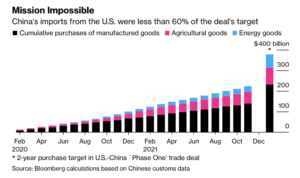A prolonged military conflict in the Middle East could potentially upend key commodity markets due to Iran’s control of the Strait of Hormuz, one of the world’s most important trade…
China’s Imports of U.S. Soybeans Climbed in November, as Biden Administration Contemplates Trade Deal Enforcement
Reuters News reported earlier this week that, “China’s November soybean imports from the United States surged from October, customs data showed on Monday, as the effects of the export disruptions from Hurricane Ida earlier this year started to clear.
“China, the world’s top buyer of soybeans, brought in 3.63 million tonnes of the oilseed from the United States in November, up from only 775,300 in October, data from the General Administration of Customs showed.
“October soybean imports from the United States declined after Hurricane Ida limited U.S. exports in September, while poor crush margins in China also curbed demand.”
The Reuters article noted that, “U.S. imports also remained much lower than a year ago, down 40% from 6.04 million tonnes in November 2020.”
Meanwhile, in other news regarding China, New York Times writer Ana Swanson reported earlier this month that, “When he assumed the White House, President Biden promised to take a different approach to China than his predecessor, saying that the Trump administration’s trade war had hurt American farmers and consumers, and failed to address significant concerns about China’s economic practices.
“But nearly a year into his presidency, Mr. Biden is stuck with ensuring that China lives up to the promises it made to President Donald J. Trump in a trade deal signed in January 2020.
China is expected to fall far short of the trade deal’s target for purchasing an additional $200 billion of American products, including energy, services, food and manufactured goods, over the course of 2020 and 2021.
The Times article noted that, “Chinese officials, in conversations with their American counterparts, have cited the global pandemic, factory stoppages and shipping disruptions as reasons for the shortfalls, according to people familiar with the talks. It is unclear how receptive the Biden administration is to that argument or whether the president will take action against China for not living up to its end of the deal.”

The article also pointed out that, “China has come closest to satisfying its target commitments on agriculture, fulfilling 83 percent of the purchases it was expected to have made by the end of October under the deal, according to tracking by [Chad P. Bown of the Peterson Institute for International Economics].
“Corn and pork sales to China have been particularly strong, after an epidemic of African swine fever decimated China’s pig herds. But exports of American soybeans, lobster and other products appear to have fallen short, according to Mr. Bown’s estimates.”
Chinese #pork imports peaked in 2020, and are ratcheting lower now. #oatt pic.twitter.com/IbtPdTUHX2
— Arlan Suderman (@ArlanFF101) December 21, 2021
Recall that in October, the Biden administration begin defining its China trade policy, and U.S. Trade Representative Katherine Tai met virtually with Chinese Vice Premier Liu He as the executive branch kicked off its trade-policy engagement with China.
More recently, President Biden and Chinese President Xi Jinping held a virtual summit last month; however, Washington Post writers Seung Min Kim, Ashley Parker, Ellen Nakashima and Lily Kuo reported at the time that, “Trade was raised, and Biden emphasized the need for China to uphold its commitments to buy additional goods from the United States, but it was not a ‘dominant part’ of the conversation, the official said.”
And on Wednesday, Bloomberg News reported that, “When the trade deal between China and the U.S. was signed in January 2020, there was some hope that it would lead to a reduction in bilateral tensions and restore some balance to trade, but those goals are proving elusive as 2021 comes to a close.
“In the 23 months since then-President Donald Trump signed the phase-one agreement, Chinese imports from the U.S. have indeed hit a new record. However, as of the end of last month Beijing was well behind on promises made — buying little more than 59% of the extra $200 billion in manufactured, agricultural and energy goods it said it would by the end of 2021.”
The Bloomberg article added that, “Both sides have said that they are continuing to discuss the trade deal, with U.S. Trade Representative Katherine Tai in October saying that the administration would talk directly to China to enforce what was agreed. However, there was no mention of trade after the nations’ leaders spoke last month. And with no new agreement, it is unclear what will happen in the new year with Chinese purchases of products like soybeans, airplanes or natural gas.”





